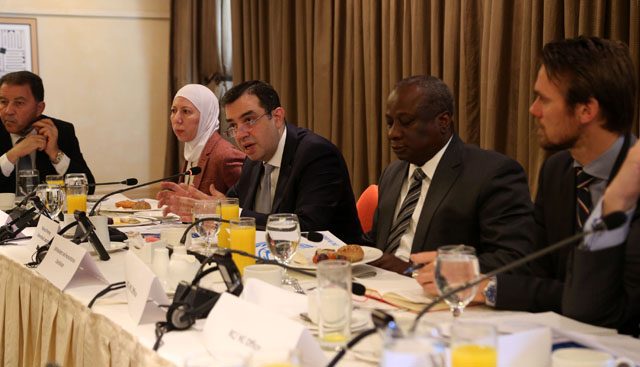AMMAN — The Syrian crisis has placed, and continues to place, an overwhelming burden on Jordan, and the Kingdom cannot meet this challenge without the strong engagement and continued generosity of partners, Planning Minister Imad Fakhoury said on Monday.
Fakhoury said this crisis is not only a refugee problem, “rather, it is impacting Jordanians, the economy at large, as well as the quality of our services, in addition to threatening the stability of the country”.
At a meeting with donors and international agencies in Amman ahead of the Kuwait III donor conference, Fakhoury said addressing the crisis will not be for the short term, stressing that the ministry is preparing a three-year plan for that purpose.
“We must also begin to look beyond the short-term horizon and, as I indicated last week, [the ministry] is preparing for development of a three-year rolling plan from 2016,” he said.
The minister added that the formal planning process will be based on a comprehensive vulnerability and needs assessment for both refugees and host communities, and "we will need your strong engagement through the Sectoral Task Force mechanism".
Fakhoury explained that the use of a three-year time frame will simplify the planning cycle, and will be coherent with Jordan's 2025 vision and its Executive Development Programme.
"The new plan also aims to further break down development and humanitarian silos to meet identified needs. We will count on full support in this endeavour, and I would welcome your views on how we might facilitate this,” he said.
The minister noted that the Kingdom is concerned about funding mobilisation.
Last year, only 37 per cent of the $2.3 billion requested for humanitarian and resilience needs in Jordan was received. Almost one quarter through 2015, the Jordan Response Plan (JRP) remains only 5.5 per cent funded, the minister noted.
The Kingdom this year announced that it needs around $2.9 billion for the current year to provide services for Syrian refugees and host communities through projects detailed in the JRP.
“The government highly recognises the extreme generosity that the international community has shown the Kingdom to date. Yet, accelerating resource mobilisation for JRP is highly needed in order for JRP to succeed in meeting the urgent needs of refugees and host communities, and to help us sustain the delivery of basic services in key sectors,” Fakhoury said.
He explained that the country’s plan includes a flexible funding structure through which support could be extended under different modalities, ranging from direct budget support, as well as budget support for specific projects, development partners, UN agencies and NGOs.
In addition, he noted that the Jordan Resilience Fund that will be signed in the coming few days is another important mechanism to channel donor contributions.
“Kuwait III is approaching and offers a great opportunity to address this very concerning shortfall. We will not only call on your further support, but also for your proposals and advocacy on behalf of Jordan with funding sources we have not yet succeeded in tapping,” Fakhoury said.
In his remarks at the meeting, UN Resident and Humanitarian Coordinator Edward Kallon said the effect of the Syria crisis on Jordan is unprecedented, and the JRP represents a groundbreaking shift in approach under national leadership.
“Success will be measured by whether it facilitates efficient flow of humanitarian and development aid in a single framework; whether it responds to priorities and improves coordination through enhanced transparency and financial tracking; and whether it lays the foundation for a new assistance architecture for the future,” Kallon said.
He added that the international community must commit to JRP as the single framework for contributions mitigating the effects of the Syria crisis.
“We must engage proactively with the government in the management architecture and mobilise significant additional resources to complement already existing and generous donor contributions,” the UN official said, adding that he will seek to ensure the United Nations system works together to support the government in this endeavour.
